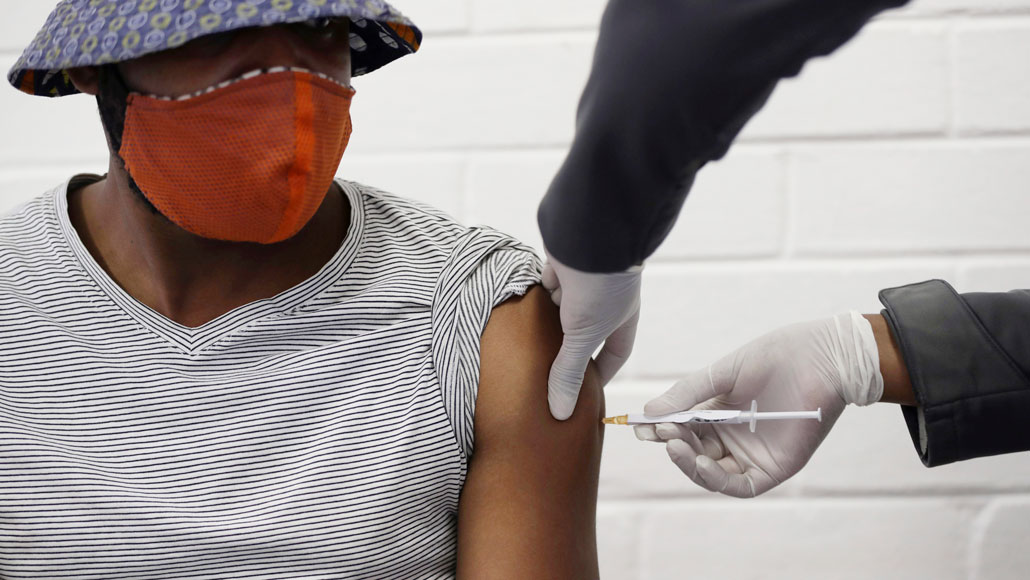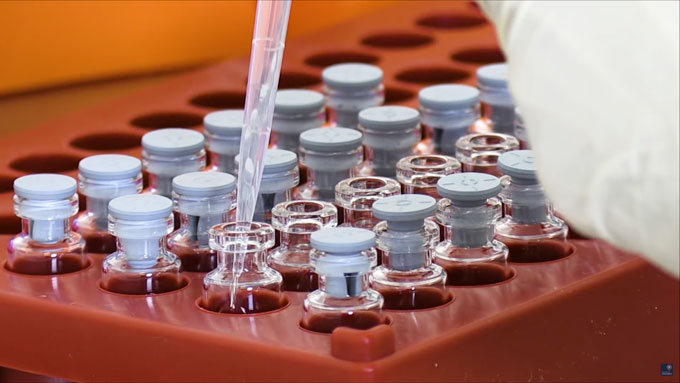Here’s what pausing the AstraZeneca-Oxford coronavirus vaccine trial really means
The halted study is science at work

The pharmaceutical company AstraZeneca put all clinical trials for its coronavirus vaccine on hold due to a potential adverse reaction in one volunteer. The pause, which affects trials under way around the world (a volunteer getting a vaccine in South Africa’s trial shown), will allow an independent panel to determine whether the illness stemmed from the vaccine or was a coincidence.
AP Photo/Siphiwe Sibeko
A single volunteer’s illness has sparked a temporary halt to the late-stage clinical trial of a leading coronavirus vaccine, an action that highlights the level of rigor needed to ensure that a vaccine is safe and effective, experts say.
AstraZeneca, which is developing the vaccine in concert with the University of Oxford, pushed pause on September 8 after a study volunteer in the United Kingdom had a suspected serious reaction. The hiatus will allow an independent review board to decide what to do next.
The illness may turn out to have nothing to do with the vaccine. If so, the trial, which may enroll as many as 50,000 people worldwide, including up to 30,000 in the United States, may resume. If the vaccine caused the illness — known as a serious adverse event — it could spell the end for AstraZeneca’s vaccine hopes. But experts say the pause is part of the tricky business of doing science and needed to happen to ensure safety.
“It was actually encouraging to see AstraZeneca take it so seriously,” says Esther Krofah, executive director of the Washington, D.C.-based nonprofit FasterCures, part of the Milken Institute think tank. “They did exactly the right thing.”
AstraZeneca is among pharmaceutical companies testing COVID-19 vaccines that, in an open letter released September 8, pledged not to be rushed by political considerations and to follow standard procedures to make sure vaccines are thoroughly tested.
What members of the public often don’t understand is that the courses of clinical trials often don’t run smoothly and Phase III trials are put on hold temporarily on a regular basis, says Seema K. Shah, a bioethicist at Lurie Children’s Hospital in Chicago. In fact, “bumps in the road are normal for vaccine trials, and they should happen if you’re studying them rigorously,” she says. “If nothing goes wrong while you’re testing it, maybe you didn’t test it well enough.”
We’ll have to wait to see if there really is a safety concern or if this was a false alarm, she says. “In normal times this would happen and it wouldn’t be international news. But right now the whole world is watching these vaccine trials and we’re all holding our breath waiting for the results.”
Vaccine trials resumed in the United Kingdom on September 12 after the U.K.’s Medicines & Healthcare products Regulatory Agency said it was safe to do so, AstraZeneca said in a statement. Brazil’s trial also resumed September 12. In the United States, AstraZeneca had just started recruiting volunteers for a Phase III trial when the pause occurred. The company, citing privacy concerns, declined to release any more medical information about the participant involved in the incident.
Prior to the restart, Science News spoke with experts about what a pause might mean for the future of a coronavirus vaccine.
Sign up for our newsletter
We summarize the week's scientific breakthroughs every Thursday.
What is this vaccine?
The vaccine is a combination of two viruses. Researchers at Oxford and a university spin-off company Vaccitech started with a weakened version of an adenovirus that causes colds in chimpanzees. This same chimpanzee adenovirus was used to make an Ebola vaccine. To fight coronavirus, the chimp virus was engineered to deliver instructions to human cells for making the iconic knobby “spike” protein from SARS-CoV-2, the virus that causes COVID-19 (SN: 7/21/20).
Some other potential coronavirus vaccines now in testing use human adenoviruses to carry the spike protein. But since many people have caught colds caused by adenoviruses, they may already have antibodies that could make the vaccine less effective. Using a chimpanzee virus that doesn’t infect people could get around that problem.

In preclinical tests with rhesus macaques, the vaccine protected against coronavirus infections, researchers reported July 30 in Nature. And in early studies in people, the vaccine stimulated production of antibodies against the spike protein, researchers reported online July 20 in the Lancet. That study tested the coronavirus vaccine in 534 volunteers.
Those people reported mostly mild side effects, such as headaches, fatigue and muscle pain. But to determine whether the vaccine actually works, and is safe, it has to be tested in many thousands of people. The halted Phase III trials were comparing the vaccine candidate to a placebo. If the vaccine works, more people in the placebo group will wind up getting COVID-19 than in the vaccinated group.
What happened?
All that is known officially is that one of the study volunteers went to the hospital after having neurological problems. Some news reports have cited unnamed sources saying that a woman participating in the trial experienced symptoms consistent with transverse myelitis, a spinal cord inflammatory syndrome.
Transverse myelitis has surfaced in vaccine trials before. Symptoms range from numbness, tingling or pain to limb paralysis and bladder problems. Doctors often treat the disorder with steroids that calm the inflammatory process, though serious cases can have long-term consequences.
“In the history of vaccine development, cases of myelitis are not especially surprising,” says Carlos Pardo-Villamizar, a clinical neurologist and director of the Johns Hopkins Transverse Myelitis Center. Though rare, transverse myelitis has popped up in vaccine trials for rabies, yellow fever and H1N1 influenza, among others, he says.
The disorder is “inflammation as a consequence of some immunological triggering factor,” he says, like a virus, bacteria or autoimmune disorder. On rare occasions, vaccines can elicit the same sort of immunological misfiring.
A similar reaction, called Guillain-Barré syndrome, was associated with the 1976 flu vaccine, where one out of 100,000 people had an elevated risk of experiencing symptoms like muscle weakness or paralysis. Since then, some vaccines have been associated with Guillain-Barré syndrome, but it’s rare. Typically, there are one or two cases per million doses of the vaccine, according to the Centers for Disease Control and Prevention.
“My message for the public is don’t panic, this is somewhat expected,” Pardo-Villamizar says, These are the sorts of complications that need to be rigorously evaluated before a vaccine is made public, he says.
Is halting a trial unusual?
No. It’s routine if an adverse event is serious enough to send a person to the hospital. It’s built into the process.
One main point of a clinical trial is to tease out any health issues related to the vaccine. Some side effects are expected and manageable, such as redness or swelling at the site of the injection, fever, aching muscles or joints, headaches or fatigue. But serious adverse events need to be studied to understand whether it was related to the vaccine or a coincidence.
Pausing a clinical trial to investigate a serious health issue “is certainly part of standard practice in ongoing trials,” says Susan Ellenberg, a biostatistician at the University of Pennsylvania’s Perelman School of Medicine. Taking time to scrutinize a reported severe reaction is a sign that the system is working, says Ellenberg. “This is what’s supposed to happen.”
Some trials’ rules would require an investigation even if a volunteer got into a car accident, just to be sure there’s no way it’s connected to participating in the trial. “These triggers are predetermined and written into protocols in ways that mean that you can’t change your mind” to gloss over a potential safety problem, says Paul G. Thomas, an immunologist at St. Jude Children’s Research Hospital in Memphis, Tenn.
What happens next?
An independent data safety monitoring board will collect the data and investigate what went wrong. Such safety boards are required for all clinical trials. “They have no vested interest in the vaccine. They’re not the people who invented the vaccine. They’re not people who could ever make money off the vaccine,” Thomas says.
Sometimes boards stop trials early because of safety concerns. Trials also might come to an early end if it becomes blindingly obvious that one group is faring much better than another, because a drug or vaccine works really well, Thomas says.
In the case of the AstraZeneca-Oxford vaccine, the first thing the board will probably do is determine whether the woman was in the group that got the placebo or the one that got the vaccine, says William Schaffner, an infectious diseases doctor at Vanderbilt University Medical Center in Nashville.
“This investigation could be very brief,” he says. “They could discover, oh that person got a placebo. No problemo. The trial can continue. It was a coincidence.”
But if the person got the vaccine, “then we’re stuck in a difficult position.” The board will have to evaluate all the data, including the volunteer’s medical history, to determine whether the vaccine caused her illness. If the board determines the vaccine was the cause, “it could bring the whole trial of this vaccine to a halt.” Schaffner says. “That’s how serious this event and its subsequent investigation is. Very heavy.”
There was no way to tell from testing in animals or in smaller numbers of people that such a side effect might happen when the vaccine was given to large numbers of people. Phase III trials are designed in part to uncover rare side effects and reactions, Schaffner says. “This is a vastly rare and unforeseen event that could not have been anticipated.”
Even if the AstraZeneca-Oxford vaccine fails, FasterCures is tracking 210 vaccines at various stages of development, Krofah says. “If one fails, there are many more under investigation.” She is encouraged that the company is following the normal clinical trial procedures. “We need to continue to focus on the science and be adamant about transparency in the data on safety and efficacy.”

Trustworthy journalism comes at a price.
Scientists and journalists share a core belief in questioning, observing and verifying to reach the truth. Science News reports on crucial research and discovery across science disciplines. We need your financial support to make it happen – every contribution makes a difference.







